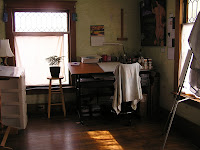Sharing a Note To Self Moment
I am a lessons learned kind of girl. I assess and analyze things to death before I do them (now) and then I do it again afterward. From valuable quality time well spent to financial compensation, I am constantly searching for the most effective, productive, and profitable use of my vertical time. Some of these lessons were obvious no-brainers, others I would never have known without having experienced this open studio event.
#1~ Never lose sight of the reason(s) you have chosen to open your studio space to the public. Are you just excited to share and show the work? Is money the main objective? Are you hoping to create or discover a new audience for your work? The motivation is as diverse as the work. Just know what your own motives are going into it and stay focused as the tour progresses.
 |
| #2~ Miniature reproductions sell better and faster than the larger, higher-priced, more difficult to transport,originals but it is STILL necessary to hang and show some of these originals. |
 |
| #3 Offer an assortment of sizes |
#6 Be sure there is plenty of room for visitors to look around and offer multiple displays so that everyone isn't trying to get into the same corner of the studio at the same time.
#7 Be sure to have at least one friendly assistant to greet the public while you are demonstrating the work that you do. Visitors are coming on the tour to see how the art is created. If you are too busy greeting and managing sales, you will not have time to do justice to the demonstration aspects of the open house nature of this event.
#8 If you are a multi-media artist, plan several projects in assorted media that you can demonstrate while visitors are in the studio. For me this means using ALL of the work stations in my studio but don't forget lesson #5 as you are planning this out.
#9 IF your work space is designed for reasonable accommodations for a disability, use this in your demonstration. Reasonable accommodations in the work place don't always mean just having room for a wheel chair. The more employers realize that there are options and low-cost methods to meet these needs, the more likely they are to hire or maintain people with disabilities without resentments of the obligation to do so.
#10 Have a plan but be open-minded and willing to make adjustments as the tour progresses.





No comments:
Post a Comment